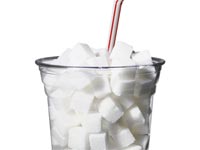AARP Hearing Center
Take a moment to consider this health care prescription from Adam Smith: "Sugar, rum and tobacco are commodities which are nowhere necessaries of life, [but] which are … objects of almost universal consumption and which are therefore extremely proper subjects of taxation." In the two centuries since, policy-makers have followed his advice — with one glaring exception: sugar.


George Washington imposed and then enforced a whiskey tax in 1791. Taxes on tobacco followed.
Beyond new revenue, the taxes on liquor and tobacco have discouraged public consumption — both by raising the price and by financing educational efforts warning against excessive public consumption of these "unnecessaries."
Now it's sugar's turn. Look at the expanding national waistline and it's clear that it's well past time for a tax on the source of most of the sugar we consume — soft drinks and candy. One-third of American adults and nearly a fifth of children are obese, according to the U.S. Centers for Disease Control and Prevention. Consider the consequences of the obesity epidemic — diabetes, heart disease and a host of other maladies — and the health care cost explosion they spark. By one count, the annual health care cost of obesity in America is $190 billion, with more than half of that paid by Medicare and Medicaid.
There are, of course, other factors behind the obesity trend — changes in diet and a more sedentary lifestyle, for instance — and the soft drink industry has been quick to make that point.
But a new University of California study offers these cold projections: A 1-cent-per-ounce tax on sweetened beverages — adding 20 cents to the cost of a $1.25 bottle of soda — would prevent nearly 2.4 million cases of diabetes, 95,000 cases of heart disease, 8,000 strokes and 26,000 premature deaths in the next decade. Researchers projected $13 billion in new annual tax revenues and, importantly, a $17 billion savings in health care costs over 10 years.
The "fat tax" is hardly a new idea. State and local sales taxes generally include soft drinks and candy. When a sugar tax was proposed as part of the health care reform bill, the food and beverage industry unleashed a $57.6 million campaign and blocked it. More recently, two years after Washington state imposed a 2-cent tax on soft drinks, the industry spent $16 million on the referendum that repealed it.
But the obesity epidemic adds an urgent note.
In one respect, the Supreme Court's pending decision on the health care law is beside the point. Whether the law is rejected or approved, the most important health care initiative for the country is to begin living smarter. Don't you think a tax on soda, fruit punch, sweet tea and sports drinks is a place to start?
Is imposing a sugar soda tax is a good idea or not?

































































More From AARP
Can Drinking Soda Really Kill You?
The bottom line on all those scary health studies you’ve heard lately